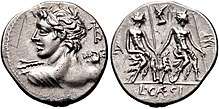Caesia (gens)
The gens Caesia was a minor plebeian family at Rome during the late Republic, and through imperial times. The first member of the gens to achieve prominence was Lucius Caesius, moneyer circa 112 BC. Under the Empire, the gens was distinguished for its literary achievements.[2]

Origin of the gens
The nomen of the Caesii may be derived from the Latin adjective caesius, meaning a light blue or blue-grey color, typically used to refer to the color of a person's eyes. The same root may have given rise to the praenomen Caeso, and perhaps also to the cognomen Caesar.[2][3]
Praenomina used by the gens
The Caesii are known to have used the praenomina Marcus, Lucius, Titus, Publius, and Sextus.
Branches and cognomina of the gens
The Caesii under the Republic are not known to have used any regular cognomina. In imperial times, the surnames Cordus, Bassus, Nasica, and Taurinus appear. The first three are typical Latin cognomina, while Taurinus may indicate that its bearer was a native of Taurinum, in northern Italy.
Members of the gens
- Lucius Caesius, triumvir monetalis in 112 or 111 BC. His coins feature the Lares Praestites, the guardian spirits of Rome.[4]
- Marcus Caesius, praetor in 75 BC.[5]
- Marcus Caesius, a rapacious farmer of the tithes in Sicilia during the administration of Verres, in and after 73 BC.[6]
- Lucius Caesius, a friend of Cicero, who accompanied him during his administration as proconsul in Cilicia in 50 BC.[7]
- Marcus Caesius, an intimate friend of Cicero, who held the office of aedile at Arpinum, the only municipium which had such a magistracy, in 47 BC.[8]
- Publius Caesius, an eques of Ravenna, enrolled as a Roman citizen by Gnaeus Pompeius Strabo.[9]
- Sextus Caesius, an eques, mentioned by Cicero as a man of great honesty and integrity.[10]
- Titus Caesius, a jurist, and pupil of Servius Sulpicius Rufus.
- Caesius Cordus, governor of Crete during the reign of Tiberius, accused of extortion and condemned.[11]
- Caesius Nasica, commander of a legion in Britain under Aulus Didius Gallus.
- Caesius Bassus, a lyric poet of the 1st century, who perished in the eruption of Vesuvius in AD 79.
- Caesius Bassus, a grammarian of uncertain date, author of the tract Ars Caesii Bassi de Metris.[12]
- Titus Caesius Taurinus, a poet, who probably lived in the 4th century, and the author of a poem, Votum Fortunae.[13][14]
See also
Footnotes
- Ovid, Fasti, v, 129-145
- Dictionary of Greek and Roman Biography and Mythology, William Smith, Editor.
- D.P. Simpson, Cassell's Latin & English Dictionary (1963).
- Crawford, Roman Republican Coinage, p. 312.
- Marcus Tullius Cicero, In Verrem, i. 50.
- Marcus Tullius Cicero, In Verrem, iii. 39, 43.
- Marcus Tullius Cicero, Epistulae ad Quintum Fratrem, i. 1. § 4, 2. § 2.
- Marcus Tullius Cicero, Epistulae ad Familiares, xiii. 11, 12.
- Marcus Tullius Cicero, Pro Balbo, 22, Epistulae ad Familiares, xiii. 51.
- Marcus Tullius Cicero, Pro Flacco, 28.
- Publius Cornelius Tacitus, Annales, iii. 38, 70.
- Elias Putschius, Grammaticae Latinae Auctores Antiqui, Hanover (1605), pp. 2664-2671.
- Johann Christian Wernsdorf, Poëtae Latini Minores, vol. iv. p. 309 ff.
- Latin Anthology, Ep. 80, ed. Burmann, Ep. 622, ed. Meyer.
![]()
Bibliography
- Marcus Tullius Cicero, Epistulae ad Atticum, Epistulae ad Familiares, Epistulae ad Quintum Fratem, In Verrem, Pro Balbo, Pro Flacco.
- Publius Cornelius Tacitus, Annales.
- Publius Ovidius Naso (Ovid), Fasti.
- Michael Crawford, Roman Republican Coinage, Cambridge University Press (1974, 2001).